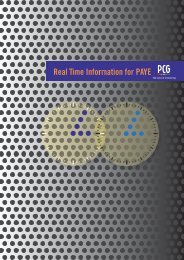Professor Anthony Glees Dr Julian Richards University of ... - PCG
Professor Anthony Glees Dr Julian Richards University of ... - PCG
Professor Anthony Glees Dr Julian Richards University of ... - PCG
- No tags were found...
Create successful ePaper yourself
Turn your PDF publications into a flip-book with our unique Google optimized e-Paper software.
a level playing field. If present employment trends and government needscontinue it is likely that in the future there will be an increasing demand forsecurity freelancers in respect <strong>of</strong> national infrastructure work. This emphasisesthe risk <strong>of</strong> creating a skill shortage by allowing the demand that contractorspossess existing security clearances to override the need for technical skills.Our work shows that there should be no doubt whatsoever about <strong>PCG</strong>‟s totalcommitment to the need for effective security clearance. Its members fullyunderstand the need for national security. Few pr<strong>of</strong>essionals in this area, wefound, have a greater respect for the security demands imposed on everyoneworking on contracts affecting our national security. <strong>PCG</strong> members are in nodoubt that rigorous security checks form a critical part <strong>of</strong> the UK‟s securitymeasures. But we have come across evidence which suggests that criticalproblems in the application <strong>of</strong> security clearance are effectively causingmarket failures and preventing certain roles being filled by the mostsuitable candidates. It is this issue which we, here, wish to target and resolve.It is precisely because no-one doubts the need for a security clearance regime,or that there are real and continuing security threats requiring strict protections<strong>of</strong> national security in personnel vetting and recruitment, that various solutionsare suggested for improving the process <strong>of</strong> managing security clearance.Our main proposal is to ensure that contractors without current securityclearances are properly considered for roles requiring such clearances, and thatthose who may already possess these clearances are not unfairly advantagedover them. On no account should recruitment agencies use possession (or nonpossession)<strong>of</strong> an existing clearance as a filter in the selection process. Indeed,it was pointed out that to do so may well contravene the formal stipulationunder the Official Secrets Act (OSA) that possession <strong>of</strong> such clearancesshould not be disclosed openly.Secondly, we propose that it become an obligation on the Cabinet Office toensure that a level playing field is applied. Monitoring the process properly mustultimately be a duty <strong>of</strong> government since no one else can perform it fully.10








